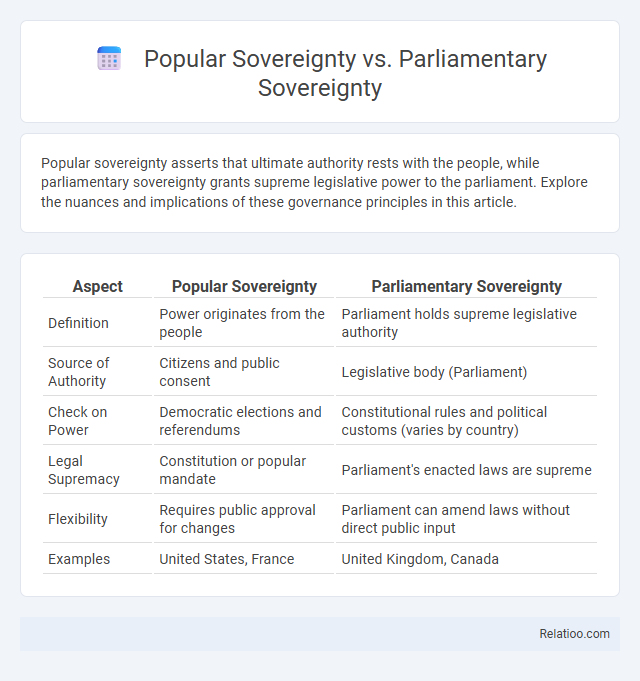Popular sovereignty asserts that ultimate authority rests with the people, while parliamentary sovereignty grants supreme legislative power to the parliament. Explore the nuances and implications of these governance principles in this article.
Table of Comparison
| Aspect | Popular Sovereignty | Parliamentary Sovereignty |
|---|---|---|
| Definition | Power originates from the people | Parliament holds supreme legislative authority |
| Source of Authority | Citizens and public consent | Legislative body (Parliament) |
| Check on Power | Democratic elections and referendums | Constitutional rules and political customs (varies by country) |
| Legal Supremacy | Constitution or popular mandate | Parliament's enacted laws are supreme |
| Flexibility | Requires public approval for changes | Parliament can amend laws without direct public input |
| Examples | United States, France | United Kingdom, Canada |
Introduction to Sovereignty: Defining the Concepts
Sovereignty refers to the ultimate authority within a political community, defining the power to govern without external interference. Popular sovereignty emphasizes that this authority derives from the people, who hold the ultimate power through democratic processes. Parliamentary sovereignty, in contrast, designates the legislature as the supreme legal authority, able to create or repeal any law without restriction.
Historical Origins of Popular and Parliamentary Sovereignty
Popular sovereignty originated during the Enlightenment as a principle asserting that political power resides with the people, influenced heavily by philosophers such as John Locke and Jean-Jacques Rousseau. Parliamentary sovereignty developed in England through historical struggles, notably the Glorious Revolution of 1688 and the Bill of Rights 1689, which established the supremacy of Parliament over the monarchy. While popular sovereignty emphasizes the role of the citizenry in legitimizing authority, parliamentary sovereignty centers on the legislative body's ultimate law-making power within a constitutional framework.
Core Principles of Popular Sovereignty
Popular sovereignty centers on the principle that all governmental power derives from the consent of the governed, emphasizing direct participation and majority rule in decision-making processes. This contrasts with parliamentary sovereignty, where the legislative body holds supreme authority without legal constraints, and with the broader concept of sovereignty, which refers to the ultimate authority within a territory. Core principles of popular sovereignty include political equality, accountability, and the legitimacy of laws based on the will of the people.
Core Principles of Parliamentary Sovereignty
Parliamentary sovereignty centers on the principle that the legislature has supreme legal authority, able to create or repeal any law, with no other body able to override or set aside its legislation. Unlike popular sovereignty, which derives power directly from the people, parliamentary sovereignty places ultimate legal power in the hands of Parliament itself. Your understanding of sovereignty must recognize that core to parliamentary sovereignty is the absence of judicial review or external legal constraints limiting Parliament's law-making powers.
Key Differences Between Popular and Parliamentary Sovereignty
Popular sovereignty is the principle where power resides with the people, who exercise authority through voting and referendums, ensuring direct control over government decisions. Parliamentary sovereignty grants ultimate legislative authority to the parliament, allowing it to make or repeal laws without external interference, emphasizing the supremacy of elected representatives over the constitution or judiciary. The key difference lies in popular sovereignty prioritizing the people's direct involvement, whereas parliamentary sovereignty centers on the legislative body's supremacy within a constitutional framework.
Popular Sovereignty in Modern Democracies
Popular sovereignty in modern democracies emphasizes the principle that ultimate political power resides with the people, who exercise this power through regular elections and referendums. This contrasts with parliamentary sovereignty, where the legislative body holds supreme authority, unrestricted by constitutional limitations. Popular sovereignty ensures government accountability and legitimacy by mandating that elected representatives reflect the will of the citizenry, thereby reinforcing democratic governance and protecting individual rights.
Parliamentary Sovereignty in Practice
Parliamentary sovereignty, a fundamental principle in the UK constitution, grants Parliament supreme legal authority, enabling it to enact, amend, or repeal any law without judicial interference. Unlike popular sovereignty, which derives legitimacy from the people's will, parliamentary sovereignty centers on the elected legislature's ultimate law-making power. In practice, this means UK courts cannot overrule or invalidate parliamentary legislation, ensuring legislative supremacy within the constitutional framework.
Advantages and Challenges of Popular Sovereignty
Popular sovereignty, emphasizing the people's direct control over decision-making, offers the advantage of increased democratic legitimacy and responsiveness to citizens' needs. However, challenges arise in ensuring informed participation and protecting minority rights within majority rule. Your understanding of popular sovereignty is crucial for balancing democratic engagement with effective governance.
Advantages and Challenges of Parliamentary Sovereignty
Parliamentary sovereignty grants the legislature supreme authority to create or repeal laws without judicial interference, ensuring decisive and adaptable governance. Its advantages include flexibility in lawmaking and the capacity to swiftly respond to political or social changes, but challenges arise from potential risks of unchecked power and lack of constitutional constraints. Your understanding of parliamentary sovereignty highlights the balance between effective legislative control and the need for mechanisms to prevent authoritarian rule.
Conclusion: Implications for Governance and Democracy
Popular sovereignty anchors governance in the will of the people, ensuring democratic legitimacy by allowing citizens to directly influence political decisions. Parliamentary sovereignty centralizes authority within a legislative body, enhancing efficiency but potentially limiting broader democratic participation. Understanding these distinctions clarifies how varying sovereignty models impact governance structures and the balance between authority and citizen empowerment in democratic systems.

Infographic: Popular Sovereignty vs Parliamentary Sovereignty
 relatioo.com
relatioo.com